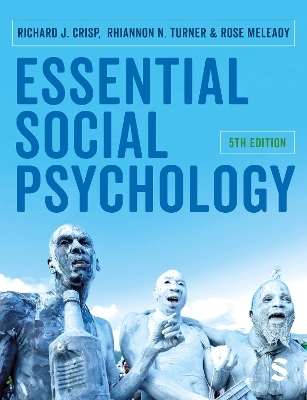
Essential Social Psychology
SAGE Publications Ltd (Verlag)
978-1-5296-6798-1 (ISBN)
Essential Social Psychology introduces you to the core topics in Social Psychology, covering its history, methods, and approaches, as well as helping you grasp key topics such as social influence, group processes, prejudice, friendship, affiliation, and love.
This new edition has a strong emphasis on real-world applications, for example exploring how social psychology was applied during the Covid-19 pandemic. It has been updated to include more in-depth coverage of contemporary topics such as social media, the digital world, as well as social justice topics, such as LGBTQ+ issues in psychology.
This book is ideal for undergraduate students of social psychology.
Richard Crisp is Professor of Social Psychology at Durham University.
Rhiannon Turner is Professor of Social Psychology at Queen’s University Belfast.
Rose Meleady is an Associate Professor in Psychology at the University of East Anglia.
Richard Crisp is Professor of Social Psychology at Durham University. He read Experimental Psychology at the University of Oxford and carried out his doctoral research at Cardiff University. In addition to Durham University Richard has held positions at the Universities of Birmingham, Kent and Sheffield as well as the Aston Business School. Richard’s research has covered the full range of topics that comprise social psychology, from the formation and reduction of prejudice, to the self and identity processes involved in interpersonal relations, from mere exposure and attitude formation, to stereotyping and social categorization. He has published this work in over 150 articles, chapters and books, including papers in American Psychologist, Psychological Science, Psychological Bulletin and Science. This work has been recognized with awards from scholarly societies, including the British Psychological Society President’s Award for Distinguished Contributions to Psychological Knowledge and Spearman Medal. Together with Rhiannon Turner he received the 2011 Gordon Allport Intergroup Relations Prize from the Society for the Psychological Study of Social Issues (for the best paper of the year on intergroup relations). He is Editor-in-Chief of the Journal of Applied Social Psychology and was founding editor of the Journal of Theoretical Social Psychology. He is a Fellow of the Academy of Social Sciences, a Fellow of the Association for Psychological Science and a Fellow of the British Psychological Society. Rhiannon Turner is Professor of Social Psychology at Queen’s University Belfast. She did her undergraduate degree at Cardiff University, her Master’s degree at the University of Kent, her doctoral research at the University of Oxford, and her postdoctoral research at the University of Birmingham. In 2007, she took up a lectureship at the University of Leeds, and she was appointed Chair at Queen’s University Belfast in 2012. The main focus of her research is intergroup relations, with a particular interest in direct and indirect forms of contact (such as extended, online, and imagined contact, and nostalgic recall of contact) as a means of changing intergroup attitudes and behaviour. She has published over 100 articles, chapters and books, including papers in American Psychologist, Journal of Personality and Social Psychology, and Psychological Bulletin, and her research has been funded by grants from the British Academy, Economic and Social Research Council, Engineering and Physical Sciences Research Council, Global Challenges Research Fund, Leverhulme Trust and the National Institute for Health Research. She has won the British Psychological Science award for Outstanding Doctoral Research Contributions to Psychology, the Foundation for Personality and Social Psychology’s Robert B. Cialdini Award for contributions to field research in social psychology and, together with Richard Crisp, the Gordon Allport Intergroup Relations Prize from the Society for the Psychological Study of Social Issues. She has held various editorial roles including Editor-in-Chief of the European Review of Social Psychology. She is currently on the editorial board of Journal of Personality and Social Psychology, British Journal of Social Psychology, and Group Processes and Intergroup Relations. She is also a Fellow of the Society of Experimental Social Psychology. She featured in the BAFTA winning 2020 Channel 4 programme, The School That Tried To End Racism, and has given evidence on the value of diversifying the school curriculum to UK Parliament. Rose Meleady is an Associate Professor in Psychology at the University of East Anglia. She did her undergraduate degree, her Master’s degree, and her doctoral research at the University Kent. She took up her current position at the University of East Anglia in 2013. Her research focuses on intergroup processes related to prejudice and discrimination. Her work has explored the benefits of intergroup contact and cross-group friendship for prejudice reduction, and the role of ideological and identity factors in prejudice. Another strand of her work has explored how social psychological research can be applied to promote more environmentally friendly attitudes and behaviour. She has published over 35 articles and chapters, including papers in American Psychologist, Current Directions in Psychological Science, Journal of Personality and Social Psychology, Perspectives in Psychological Science, and Science. Her research has been funded by grants from the Leverhulme Trust and Innovate UK, as well as commercial bodies. She has experience communicating research to non-academic audiences to shape policy and practice and has served as a psychological expert for UK Parliament and UNESCO. She is an associate editor of Group Processes and Intergroup Relations and an editorial board member at the Journal of Theorectical Social Psychology.
CHAPTER 1: HISTORY, METHODS, AND APPROACHES
CHAPTER 2: ATTRIBUTION
CHAPTER 3: SOCIAL COGNITION
CHAPTER 4: ATTITUDES
CHAPTER 5: SOCIAL INFLUENCE
CHAPTER 6: GROUP PROCESSES
CHAPTER 7: SELF AND IDENTITY
CHAPTER 8: PREJUDICE
CHAPTER 9: INTERGROUP RELATIONS
CHAPTER 10: AGGRESSION
CHAPTER 11: PROSOCIAL BEHAVIOUR
CHAPTER 12: AFFILIATION AND ATTRACTION
CHAPTER 13: FRIENDSHIP AND LOVE
CHAPTER 14: APPLICATIONS
| Erscheinungsdatum | 05.04.2024 |
|---|---|
| Verlagsort | London |
| Sprache | englisch |
| Maße | 189 x 246 mm |
| Gewicht | 1190 g |
| Themenwelt | Geisteswissenschaften ► Psychologie ► Psychoanalyse / Tiefenpsychologie |
| Geisteswissenschaften ► Psychologie ► Sozialpsychologie | |
| Sozialwissenschaften ► Soziologie | |
| ISBN-10 | 1-5296-6798-4 / 1529667984 |
| ISBN-13 | 978-1-5296-6798-1 / 9781529667981 |
| Zustand | Neuware |
| Informationen gemäß Produktsicherheitsverordnung (GPSR) | |
| Haben Sie eine Frage zum Produkt? |
aus dem Bereich


